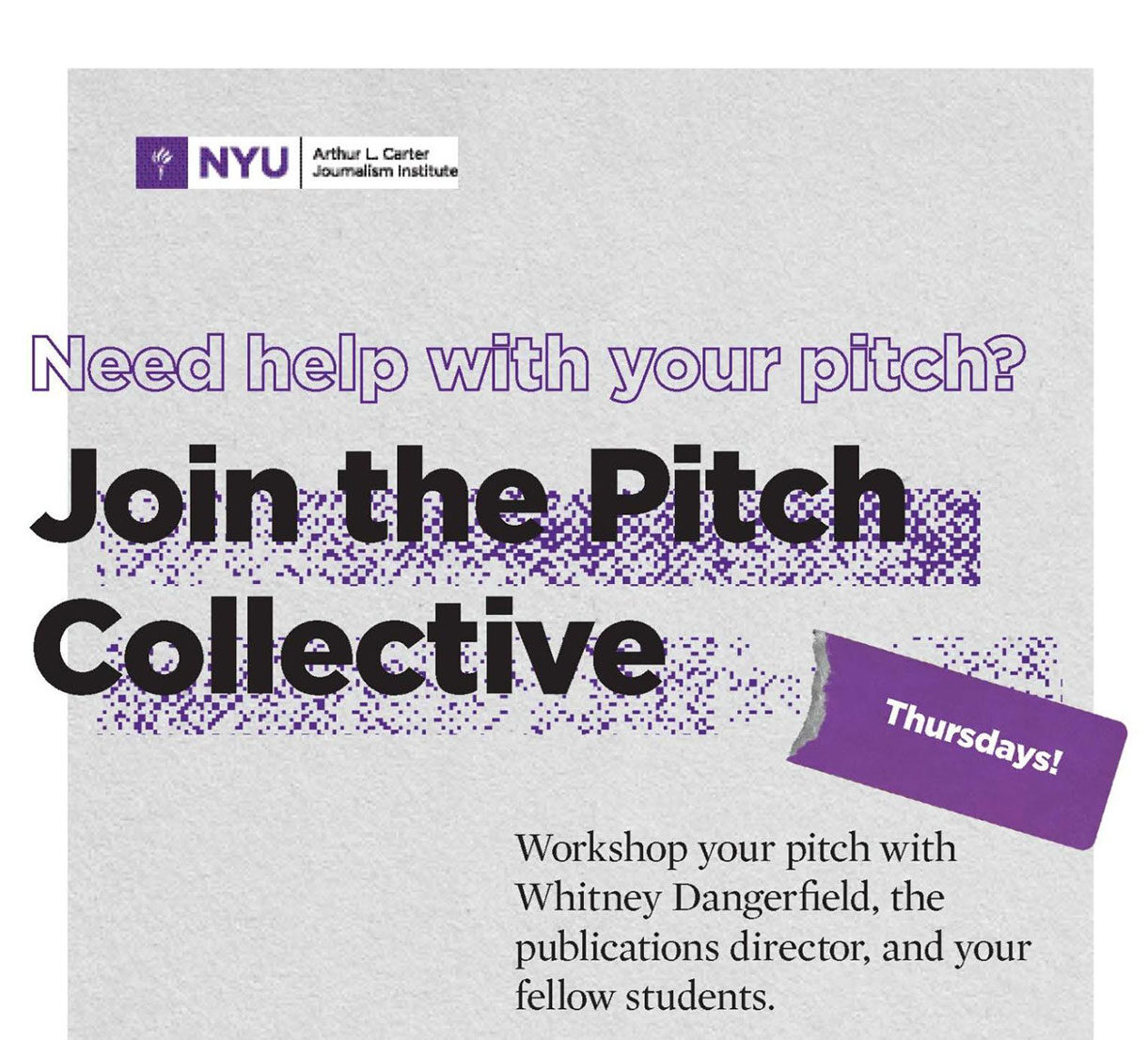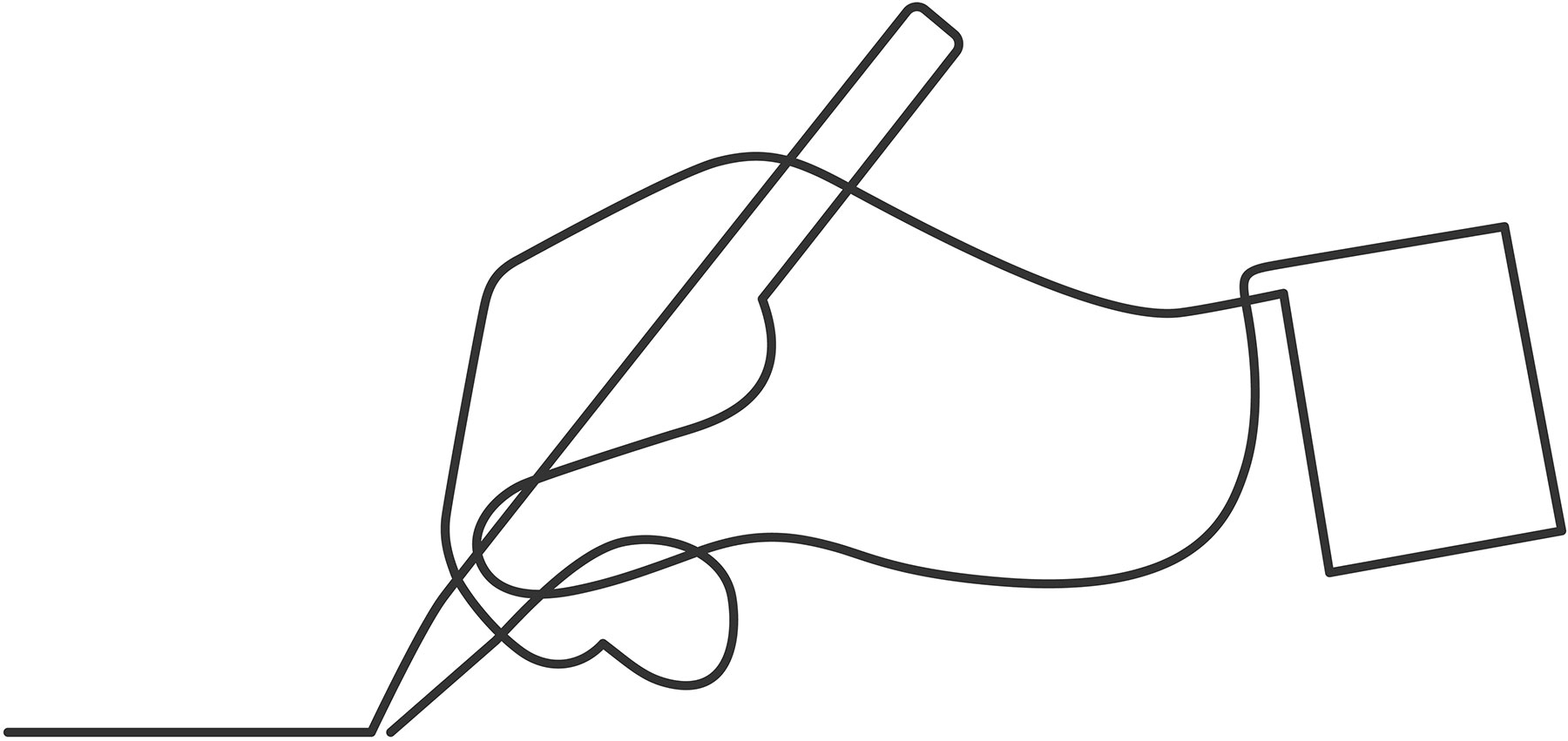Journalism students face a Catch-22: They need clips to get clips.
At NYU’s Arthur L. Carter Journalism Institute, we help students feel comfortable pitching, by providing resources and workshops. We also help create opportunities for students to be published.
Pitching Basics for Writers
Pitch an angle, not a topic
Climate change is a topic. How billions of sea life in the Pacific Northwest died during a four-day stretch in June is an angle. Make sure your article has a clear thesis.
Think like an editor
Remember that an editor often must pitch your story to other editors. Make it easy for her by being clear in the email (and in your mind) what your story is about.
Come up with a headline and a dek
This exercise will help you find and clarify your thesis. The hed and dek may not stick, but they will help an editor understand what you’re pitching.
Why you? Why now?
Know the answers to these questions before you pitch. If the answer to “why now?” is “because I was able to get the person on the phone” or “because I think it’s interesting,” keep thinking about your idea. What reporting or access can only you share? Why is running your article important now?
Know the publication
Read the newspaper or magazine to which you’re pitching. Familiarize yourself with the different sections and series. Does the publication take freelance? Has it covered your angle already? The more you read, the more targeted you can be in your pitch.
Be specific
If a pitch feels too general, an editor likely won’t commission your article. Think of what you would say to a friend about your work. You wouldn’t speak in generalities; you’d tell them about the aspects of the story that most excite you, the elements that feel most important.
Make the pitch short
In your pitch, aim for three short paragraphs, tops. If you can get the email shorter, then even better. Pitch the story in a paragraph and give the editor some sense of why it works for his section. Then briefly, give your credentials.
Find the right editor
If possible, email the editor who covers your area of interest. Look at the publication’s masthead, follow editors on Twitter, read “how to pitch” pages. If you can’t find an editor’s name and email address, don’t worry. General pitch email addresses also work, but it’s always better to email a person.
Pitching Resources
Editors at many publications explicitly tell writers how to pitch. Take a look at these “How to Pitch” pages. They are helpful whether you want to pitch these particular publications or not.
How to Pitch The New York Times (or, well, anywhere else)
This American Life: Sample Pitches
Need help with your pitch? Join the Pitch Collective
Workshop your pitch with Whitney Dangerfield, the publications director, and your fellow students.
Thursdays, 3:30pm – 4:30pm beginning Sept. 7.
NYU Journalism Institute, 20 Cooper Square, Room 600.

Panels
How to Freelance Successfully 2025
Get advice from two recent grads with great freelance records. Talia Barrington, a graduate of the CRC program, has written for The Atlantic, The Washington Post, The Cut, Cosmopolitan, Slate, and other publications. Arielle Domb, also a CRC graduate, has written for The New York Times, Vogue, Cosmopolitan, Guardian, Huck Magazine, Brooklyn Magazine, and more.
What Editors Wish Freelancers Knew Fall 2024
Jeffrey Bloomer, the editorial director at Slate, and Rachel Sonis, the Ideas editor at Time, discuss what writers should know about editors’ work, how to make the editorial process go smoothly, and what they’re looking for in pitches.
Pitching Audio Stories
NYU-Journalism Publications Director Whitney Dangerfield, Alex Goldmark from Planet Money, and Diane Wu from This American Life talk about how their story processes work.
What Editors Wish Freelancers Knew Spring 2024
Rob Fischer, a senior editor at The New Yorker; Justin Miller, deputy editor of New York Magazine’s Intelligencer; and Susan Matthews, executive editor of Slate, to hear about what makes for a good pitch and how freelance writers can best work with them.
How to Freelance Successfully 2023
How long do you wait after you’ve sent your pitch to follow-up? How many ideas do you have going at once? How do you find the right editor? Get advice from two experts: John Surico regularly writes for The New York Times, Bloomberg, Hell Gate, and other publications. Felipe De La Hoz writes for The Intercept, The New Republic, and The Nation, among other publications.
How to Freelance Successfully 2022
Alyson Krueger, a graduate of Magazine and Digital Storytelling, regularly writes for The New York Times and other publications. Elizabeth Flock graduated from Literary Reportage. Her features and films have appeared on the PBS NewsHour and in the New Yorker among other publications.
When Your Idea Is Actually a Book
John Hendrickson, a senior editor at The Atlantic, and Jonathan Segal, a vice president and executive editor at Alfred A. Knopf, talk about what makes an idea a magazine story versus a book. John wrote The Atlantic article “What Joe Biden Can’t Bring Himself to Say,” named one of the best stories of 2019 by Longform. His reported memoir Life on Delay grew out of that magazine article.
What Editors Wish Freelancers Knew
Micah Hauser, an editor at The New Yorker, Jane Kim, the culture editor of The Atlantic, and Hilary Howard, a features editor at The New York Times Metro desk, to talk about what writers should know about their work as editors, how to make the editorial process go smoothly, and what they’re looking for in pitches.
Pitching New York Stories
Join Brian Braiker, the editor-in-chief of Brooklyn Magazine, Sukjong Hong, an editor at Curbed, and Max Rivlin-Nadler, one of the founders of Hell Gate, to talk about what stories work for them, what makes for a good pitch, and how freelance writers can best work with them.
Newsletter
The publications director is working with editors to create opportunities for students. Check out the “Getting Published” newsletter for tips from students, Q&As with professional writers and editors, and calls for pitches.
Archive:
Fall 2022: September | October | End of Semester
Spring 2023: February | March | End of Spring Semester | September | End of Fall Semester
2024: Mid-Spring | End of Semester
Spring 2025: Issue 1 | Issue 2 | Issue 3 | Issue 4 | Issue 5 | Issue 6
Have you been published?
Let us know when you’ve been published by filling out this form. We’ll then share the piece on social media and on our website.

Meet Whitney Dangerfield, Publications Director
Whitney has more than 20 years of experience in journalism. She was most recently a senior editor at The Atlantic. Before that, she was the digital editor at Serial and This American Life, a senior staff editor at The New York Times, and an editor at National Geographic Magazine.
Email: whitney.dangerfield@nyu.edu
Phone: 212-998-7912
Office Hours:
Tuesdays and Wednesdays (Room 641)
2 p.m. – 4 p.m.
Other times by appointment.

